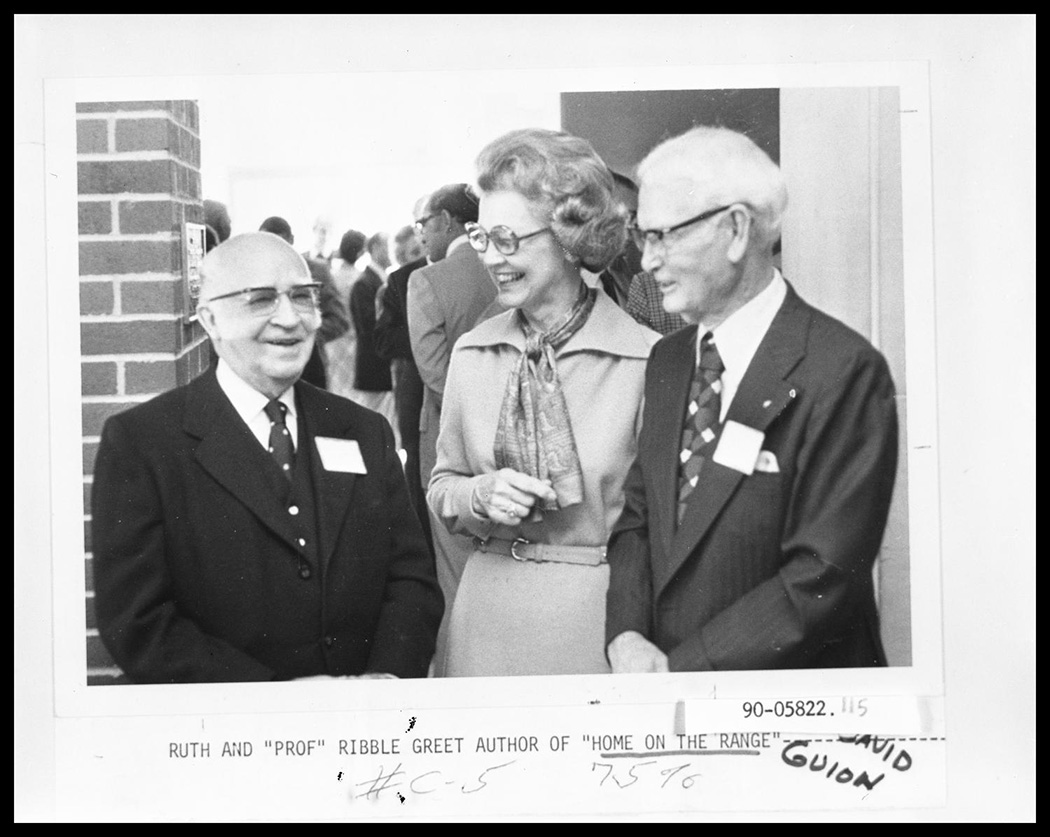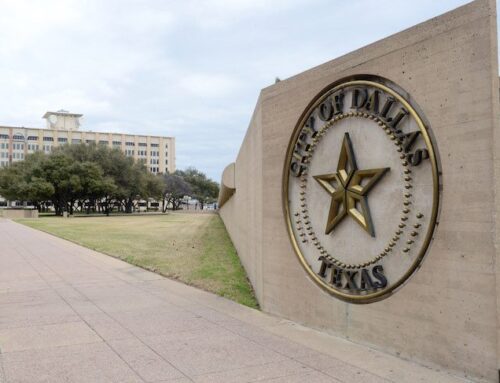
Hardin-Simmons University officials greet David Guion, left, at a reception in Abilene. Photo courtesy of The Portal to Texas History.
David Guion’s “Home on the Range” debuted at the Roxy Theatre in New York City and was broadcast on national radio programs to audiences across the United States. But the most memorable place the composer ever heard his famous work was in a seedy bathroom.
“As I entered, I heard two drunks sitting on the John with their britches down singing ‘Home on the Range’ at the top of their lungs,” Guion says in a 1974 interview at his home on Monticello Avenue. “That’s the funniest place I ever heard it.”
Guion made his name in New York City, but his West Texas upbringing inspired the cowboy tunes and African American spirituals that made him famous.
Born in 1892, Guion grew up with eight siblings in a wooden house in the ranching town of Ballinger. He developed a love for the plains and prairies through family camping trips. During the day, they fished and rode horses. At night, the chuckwagon cook played his fiddle, and they danced to tunes like “Turkey in the Straw” and the “Arkansas Traveler.”
At 6 years old, Guion started taking music lessons in San Angelo from British piano instructor Charles Finger. Every Saturday, his mother sent him on the Santa Fe railway with a neck placard, stating his name and destination. A few years later, Guion began writing his own compositions.

“I never planned to be a composer,” Guion says. “I’d planned to be a concert pianist. I was just writing because I have a creative brain. It was there and had to come out.”
Only once did his family try to derail his music career by encouraging him to attend military school. His father booked Guion’s dorm room, packed his trunk and purchased a train ticket. But 30 minutes before departure, Guion was nowhere to be found. He had saddled his horse and rode through the prairie until 4 a.m.
“That was the end of my military training,” Guion says. “My father decided he had a boy with a mind of his own and didn’t try to send me anywhere else.”
Guion’s musical studies took him to Vienna to train under Leopold Godowski at the Royal Conservatory of Music, but he was forced to return to Texas with the onset of World War I. He moved to Lakewood in 1920 and taught in the piano department at Southern Methodist University. During that time, he met his wife, and they married in a house on Gaston Avenue. Two years later, their divorce spelled the end of his tenure at SMU, and he moved to New York City.
While there, he met blues singer Nora Bayes and wrote her the song, “Old Maid Blues,” which became his first hit. She introduced him to publishers at G. Schirmer, Inc. who agreed to an exclusive contract that brought new popularity to his music.

His greatest hit, “Home on the Range,” emerged from his production, “Prairie Echoes,” which featured ropers and cowboy dances. It was so successful, NBC broadcast an hourlong radio program that ran from coast to coast. Guion, dressed in cowboy regalia, arrived for the live show in a Cadillac with a police escort that stopped traffic on Fifth Avenue.
During his heyday, he received fan mail from around the world, played in the most prestigious venues and performed on two weekly radio shows that inspired the singing cowboy character, which appeared in Westerns throughout the 1930s and ’40s.
“I was having too good a time in New York,” Guion says. “All the wealthy people were entertaining me, and we had some wild parties.”
One night, two police officers arrived at his home in Greenwich Village and said he was to accompany them to Brooklyn. The police took him to a friend’s house, and when he knocked on the door, the host said, “I hope this will teach you a lesson. You forgot all about the dinner I’m giving in your honor, and I had to send the police to come get you.”
Guion retired from public life in 1936 and bought his own home on the range in a Pennsylvania valley. The government later condemned his property to build a dam, and he moved back to his house in Lakewood. He continued composing ballets, religious selections, love songs and piano pieces. When he died in 1981, it was with few career regrets.
He says, “I like everything I’ve ever written.”





